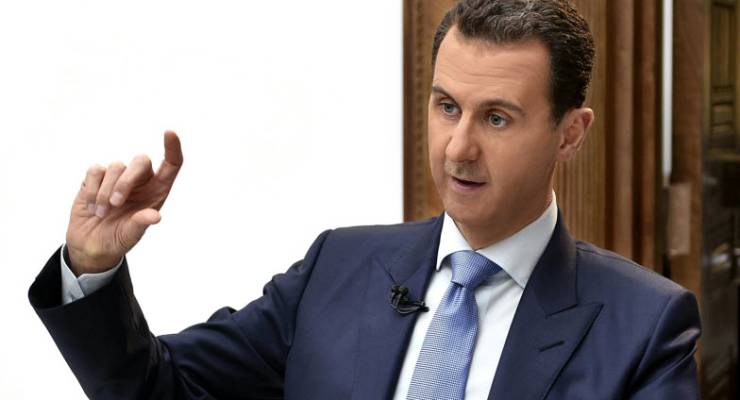
Instead of cheering the US’ increasingly robust use of military firepower as the first response to international crises, Western leaders should be ring-fencing Trump’s instinct to reckless behaviour in order to avoid a catastrophe.
Going by his instant, unqualified and uncritical support for the US cruise missile strikes on Syria, our prime minister’s loyalty to our major ally calls to mind a campaigning line from the great anti-nuclear days of the 1980s in New Zealand. Malcolm Turnbull will faithfully promise to follow Donald Trump to the end of the world, and Trump promises to do his very best to bring about the end of the world.
Three questions are worth asking:
- Given their respective known traits, why has the Trump narrative on Syria’s chemical weapons incident been believed rather than that of Russia’s President Vladimir Putin?
- Why should we entrust world peace in the quality of Trump’s rather than Putin’s decision-making?
- For most countries, which breach of international law and norms is worse: use of chemical weapons by either party inside Syria, or the unilateral use of military force by a major power against a sovereign state?
Trump and Putin are the leaders of countries with 14,000 nuclear weapons — 94% of global stockpiles. About 4000 of these are deployed, including 1800 ready for instant launch on presidential authorisation. Both leaders pursue “America First” and “Russia First” policies respectively to make their own country great again. But only one of the two countries has a string of military bases and hundreds of thousands of troops deployed in distant hotspots encircling the globe. Over the past two decades, only one has threatened, bombed, attacked, invaded — and forcibly removed leaders of — many other countries. (In the decades after 1945, by contrast, the former Soviet Union was the main menace to world peace while America built and sustained the liberal international order and its normative architecture.)
Between Trump and Putin, only one is widely believed, including by his own citizens, to be paranoid, volatile, erratic, inconsistent, bombastic, vulgar, shallow, and a morally compromised individual. He can be moved by TV images of suffering children to bomb a country but bans their people, the same suffering children, from coming to his own country as desperate refugees. Only one — but not the same one — pursues a coherent foreign policy informed by long-term strategic purpose.
This raises a key puzzle: both countries are engaged in the Syrian conflict, albeit on different sides, that is a tangled mess of internal, regional, and global conflict, parties and patrons. They offer contrasting narratives of heinous incidents. Chemical weapons were used in an attack on Khan Sheikhun on April 4. Trump blamed the Syrian air force. Putin dismissed this as self-serving fabrication and claimed that chemical weapons stored on a rebel-held base were released after a Syrian strike.
[Rundle: Syrian airstrikes won’t lead to World War III]
Putin called for an independent international investigation to establish facts and culpability. Instead Trump hit Syria with almost five dozen cruise missiles. Western leaders largely backed the US strikes, Americans were jubilant at throwing off the Barack Obama-era strategic restraint, and most Western analysts bought into the Trump narrative of enforcing international law against the use of chemical weapons, with the US once again setting the world’s moral compass. When Fareed Zakaria gushed that in this one act “Trump became president”, he was not using irony to indicate that bombing other countries has become a necessary rite of passage for a modern American leader. Zakaria was expressing genuine adoration of Dear Leader.
Could the discrepancy be greater between what most Americans believe about Trump’s leadership credentials and individual morality, and their support of him as the champion of international law and global norms? Or between the record of recent US international behaviour and Western support of America being the international law enforcement sheriff?
The long history of US presidents dissembling about confused incidents to launch or escalate wars includes the notorious 1964 Tonkin Gulf incident in the Vietnam war and allegations of Saddam Hussein’s weapons of mass destruction (WMDs) to invade Iraq in 2003 and capture and execute Saddam. In Syria itself, with respect to the chemical weapons attack in a Damascus on August 21, 2013, investigative journalist Seymour Hersh concluded that Obama, like Bush in Iraq in 2003, had cherry-picked facts and intelligence, presenting assumptions as facts and omitting important intelligence pointing to jihadists’ capability to mount a chemical weapon attack. Trump effectively followed the template of bomb first, prove later — exactly the sequence George W. Bush adopted in Iraq in 2003 to commit the greatest geopolitical blunder since the Second World War …
*Read the rest at John Mendaue’s Pearls and Irritations
*Ramesh Thakur is professor in the Crawford School of Public Policy, Australian National University.







I don’t believe any of them, but I believe Trump less.
Me too.
Putin may or may not be paranoid. Russia as a nation is. One of them also regularly has opponents killed and it is not Trump (yet). Both are quite narcissistic and neither is ever mistaken. I would not favour one word over another and I would not believe the Turks at present if Erdogan said the sun had risen without checking. The explanation given by Putin is scientific claptrap. The symptoms, however, could have been caused by exposure to strong organophosphates other than Sarin. I do not for one moment think there was strategy in Trump’s action. It was an excuse to distract us from the scandals at home and displays an alarming capriciousness. I have a similar amount of faith in the veracity of Putin, a long proven liar.
Oops! My browser seems to have been redirected to Russia Today.
Do you prefer Kingsland’s Langley VA stenography?
No point crafting an intelligent answer to this. So I say only “duh”.